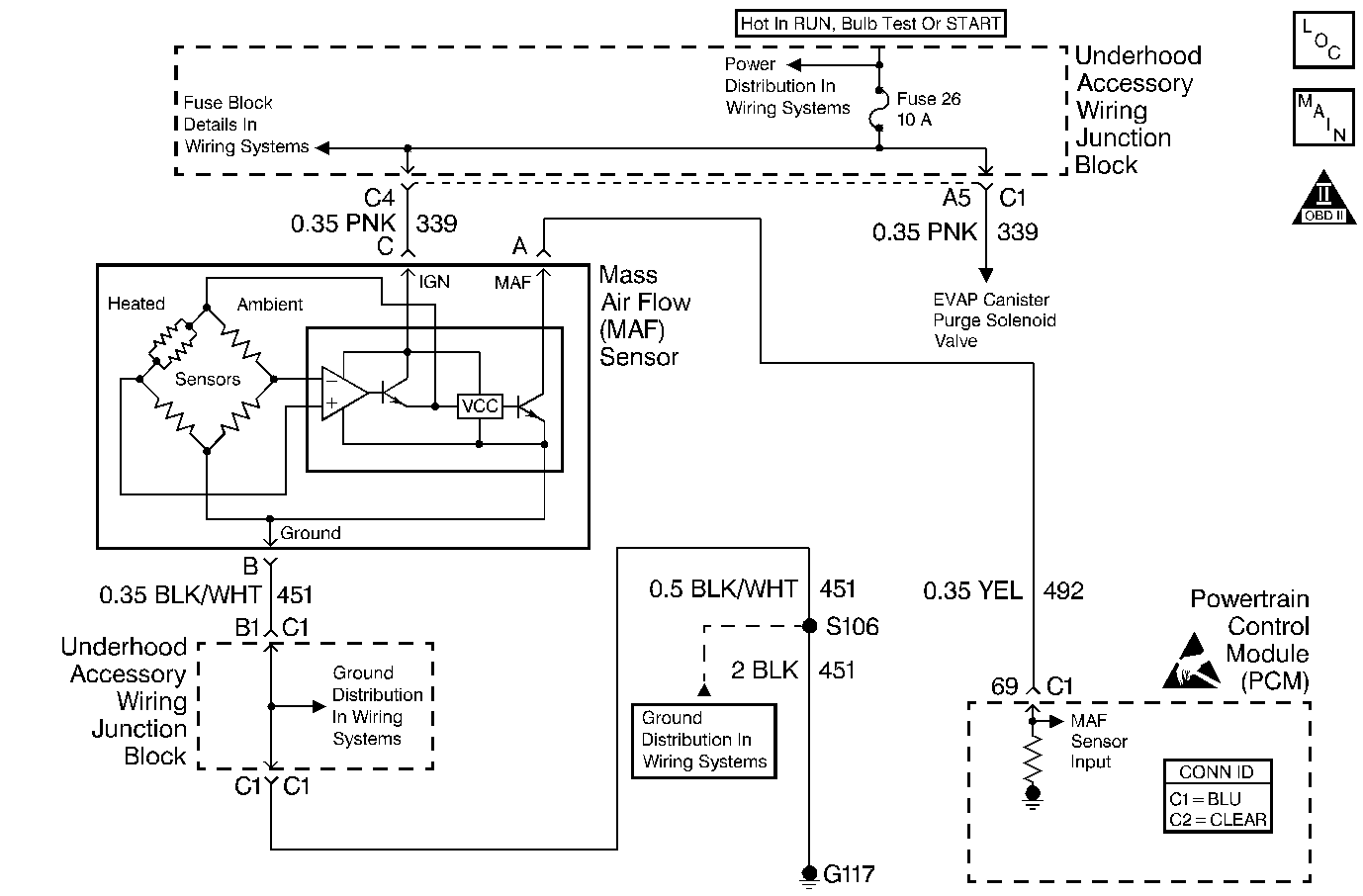
Circuit Description
The Mass Air Flow (MAF) sensor measures the amount of air which passes through it into the engine during a given time. The PCM uses the mass air flow information to monitor engine operating conditions for fuel delivery calculations. A large quantity of air entering the engine indicates an acceleration or high load situation, while a small quantity of air indicates deceleration or idle.
The MAF sensor produces a frequency signal which can be monitored using a scan tool. The frequency will vary within a range of around 2000 Hertz at idle to near 8,000 Hertz at maximum engine load. DTC P0103 will be set if the signal from the MAF sensor is above the possible range of a normally operating MAF sensor.
Conditions for Running the DTC
| • | The engine is running. |
| • | Ignition voltage greater than 8 volts. |
| • | Throttle angle below 50%. |
Conditions for Setting the DTC
| • | MAF signal frequency is above 11,500 Hertz (11.5 kHz). |
| • | The condition is present for 12 seconds. |
Action Taken When the DTC Sets
| • | The PCM will illuminate the malfunction indicator lamp (MIL) during the second consecuitive trip in which the diagnostic has been run and failed. |
| • | If equipped with traction control, the PCM will command the EBTCM via the serial data circuit to turn OFF traction control, and the EBTCM will illuminate the TRACTION OFF lamp. |
| • | The PCM will store conditions which were present when the DTC set as Freeze Frame and Failure Records data. |
Conditions for Clearing the MIL/DTC
| • | The PCM will turn OFF the MIL during the third consecutive trip in which the diagnostic has been run and passed. |
| • | The History DTC will clear after 40 consecutive warm-up cycles have occurred without a malfunction. |
| • | The DTC can be cleared by using the scan tool. |
Diagnostic Aids
| • | Check for the following conditions: |
| • | Poor connection at PCM Inspect harness connectors for backed out terminals, improper mating, broken locks, improperly formed or damaged terminals, and poor terminal to wire connection. |
| • | Misrouted harness Inspect the MAF sensor harness to ensure that it is not routed too close to high voltage wires such as spark plug leads. |
| • | Damaged harness Inspect the wiring harness for damage. If the harness appears to be OK, observe the scan tool while moving connectors and wiring harnesses related to the MAF sensor A change in the display will indicate the location of the fault. |
If DTC P0103 cannot be duplicated, the information included in the Fail Records data can be useful in determining vehicle mileage since the DTC was last set.
Test Description
The numbers below refer to the step numbers on the Diagnostic Table:
-
This step verifies that the problem is present at idle.
-
A frequency reading with the MAF sensor connector disconnected indicates an Electro-Magnetic Interference (EMI) related fault or a poor connection.
-
This vehicle is equipped with a PCM which utilizes an Electrically Erasable Programmable Read Only Memory (EEPROM). When the PCM is being replaced, the new PCM must be programmed.
Step | Action | Value(s) | Yes | No | ||||
|---|---|---|---|---|---|---|---|---|
1 | Was the Powertrain OBD System Check performed? | -- | ||||||
Is MAF FREQUENCY below the specified value? | 11.5 kHz (11,500 Hertz) | |||||||
3 |
Does scan tool indicate DTC P0103 failed this ignition? | -- | Go to Diagnostic Aids | |||||
Does scan tool indicate a MAF FREQUENCY at the specified value? | 0 Hz | |||||||
5 |
Was a poor connection found? | -- | ||||||
6 | Replace the MAF sensor. Is the action complete? | -- | -- | |||||
7 |
Was a problem found? | -- | ||||||
8 |
Was a poor connection found? | -- | ||||||
Replace the PCM. Important: : Replacement PCM must be programmed. Refer to Powertrain Control Module Replacement/Programming . Is the action complete? | -- | -- | ||||||
10 |
Does scan tool indicate DTC P0103 failed this ignition? | -- | System OK |
